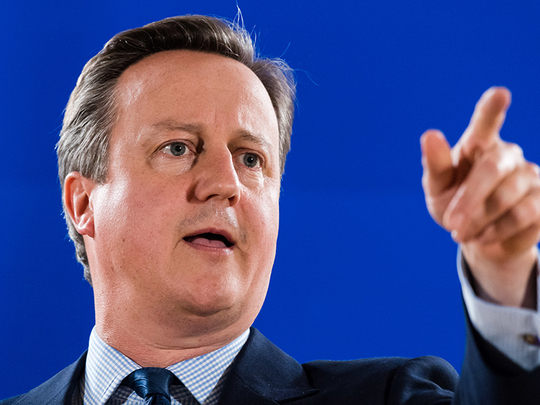
When they gave him his send-off just two months ago, the House of Commons was warm and generous to former British prime minister David Cameron. A standing ovation on one side of the chamber, sustained applause on the other. But history won’t be anything like as kind.
Wednesday’s report from the foreign affairs select committee on the 2011 military intervention in Libya has taken another axe to his reputation. Coming just two days after Cameron’s announcement that he will stand down as an MP — which brought a torrent of criticism for breaking an earlier promise to serve out his term — it shows just how roughly posterity is likely to treat him. The committee piles on its condemnation, attacking the Libya operation at every stage: Before, after and during. It says there was insufficient analysis of the intelligence in the lead-up to battle.
That the mission changed once it began. And that next to nothing was done for Libya after the bombs had fallen. It’s a long, detailed endorsement of the verdict recently delivered by United States President Barack Obama on the Libya adventure. And the MPs of this Conservative-dominated committee are unsparing in who they blame. “Through his decision-making ... former prime minister David Cameron was ultimately responsible for the failure to deliver a coherent Libya strategy.”
Cameron might well feel that dumping all the blame on him is a bit rich, considering that almost the entire House of Commons backed him on his Libya decision. On the day, 557 MPs voted for intervention. They include the man who is the lead author of Wednesday’s scathing report — Foreign Affairs Committee chair Crispin Blunt, and almost all Labour MPs.
True, Jeremy Corbyn and John McDonnell were among the 13 from all parties who voted ‘no’ — unsurprising given that they tend to vote against any use of force anywhere, at any time, whatever the circumstances. But Corbyn ally Diane Abbott voted with Cameron and so did the shadow foreign secretary Emily Thornberry. Doubtless, they were persuaded — as I was — by the need to repel what appeared to be an imminent threat from former Libyan leader Muammar Gaddafi to slaughter the civilians of Benghazi. Blunt’s committee now says that threat was “overstated”.
But it clearly didn’t strike him that way at the time, or else he — like those 556 other MPs — would not have voted ‘yes’. The more incisive charge is that Cameron allowed the original mission to creep into an undeclared pursuit of regime change. The report says that if the primary purpose was “the urgent need to protect civilians in Benghazi, then this objective was achieved in March 2011 in less than 24 hours.” (Which is why some voices, myself among them, were calling for military action to stop so soon after it had begun.) But Cameron carried on, apparently determined to topple Gaddafi.
Worse still, is the lack of interest Cameron paid to Libya after the bombing was done. Sure, he was happy enough to pose for a liberators’ photo-op with the then French president Nicolas Sarkozy. But afterwards, nothing. Obama puts it kindly when he says Cameron became “distracted”.
And so the British PM did nothing as Libya slid into civil war, anarchy and mayhem. It all adds yet more colour to the sketch history is likely to draw of Cameron. That he was hopelessly short-termist, too often acting for the moment, doing what he needed to get out of an immediate hole, but failing to think things through. Sometimes, in the day-to-day tumble of domestic politics, that approach did little harm and served him well. It made him agile. But when blood and lives were at stake, it was a fatal flaw.
Grave though the Libya case is, however, it will not be the one that defines him. That will always be Brexit, and Cameron’s decision to gamble with something as vital as Britain’s membership of the European Union. But the same character flaws were present in both episodes: The recklessness, the lack of preparedness, the failure to weigh up all the possible consequences. The European calamity of 2015 will be Cameron’s lasting legacy, but the warning signs were there four years earlier.
— Guardian News & Media Ltd
Jonathan Freedland is a weekly columnist and writer for the Guardian. He is also a regular contributor to the New York Review of Books and presents BBC Radio 4’s contemporary history series, The Long View. In 2014 he was awarded the Orwell Special Prize for journalism. He has also published eight books including six bestselling thrillers, the latest being The 3rd Woman. He tweets @freedland










